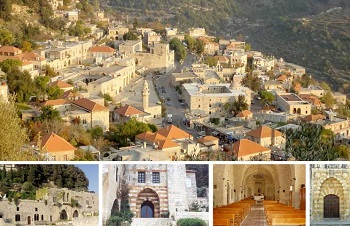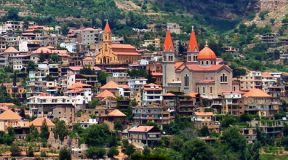Deir al-Qamar is an amazing ancient city in Lebanon, which preserved its architectural features from 17 to 18 centuries.
This pattern continues until you reach Beit Din, you will enjoy walking in the beautiful old streets, gardens roses blossoming and jasmine will attract you to an unforgettable sight, along with the outdoor stone benches, full of chrome hanging in front of houses, flowers, houses and narrow streets. All this makes the city a fascinating place.
- Historical Significance:
- Palace of Emir Fakhreddine II: This 17th-century palace is a major historical landmark in Deir al-Qamar. It was the residence of Emir Fakhreddine II, a prominent Lebanese ruler. The palace features traditional Lebanese architecture and offers insight into the region's history.
- Moussa Castle: Built by Moussa Abdel Karim Al-Maamari, Moussa Castle is a unique structure made of stone and is filled with his personal collections. It's both a museum and a testament to the creator's vision and determination.
- Historic Churches and Mosques: Deir al-Qamar is home to several historic religious sites, including the Our Lady of the Hill Church and the Mosque of Emir Fakhreddine.
- Architecture:
- The village is characterized by its well-preserved traditional Lebanese architecture. Visitors can explore narrow cobblestone streets lined with stone houses adorned with wooden balconies and red-tiled roofs.
- Cultural Experience:
- Festivals and Events: Deir al-Qamar hosts various cultural events and festivals throughout the year, offering visitors a chance to experience local traditions, music, and dance.
- Local Cuisine: Tourists can savor traditional Lebanese cuisine in local restaurants and cafes. The village's eateries often serve dishes using fresh and locally sourced ingredients.
- Natural Beauty:
- Surrounded by lush greenery and mountains, Deir al-Qamar offers stunning views of the Chouf region. The natural landscape provides opportunities for hiking and exploring the outdoors.
- Chouf Biosphere Reserve:
- Located nearby, the Chouf Biosphere Reserve is a UNESCO-listed area known for its diverse flora and fauna. Nature enthusiasts can take guided tours to explore the reserve's trails and learn about the local ecosystem.
- Souvenir Shopping:
- Visitors can purchase local crafts, handmade goods, and souvenirs in the village's shops, supporting the local economy.
- Accessibility:
- Deir al-Qamar is easily accessible by road from Beirut, making it a convenient day trip or weekend getaway for both local and international tourists.
Before planning a visit, it's advisable to check for any travel advisories or updates on local conditions. The information provided here is based on my knowledge up to January 2022, and conditions may have changed since then.
Explore more regarding tourism in Lebanon from here.







